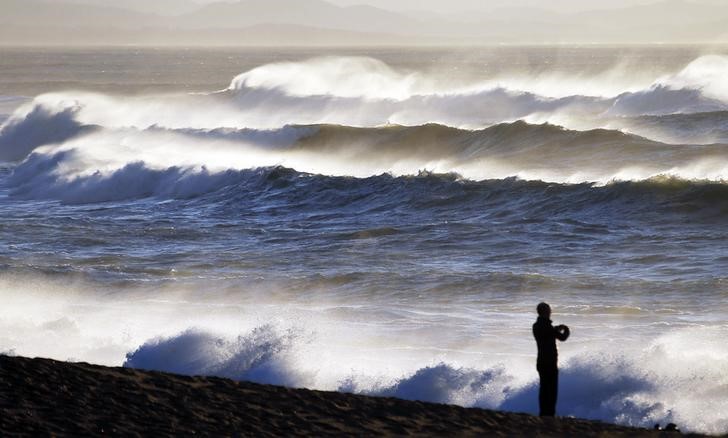* Sea level rise increased to 3.3 mm a year in 2014 - scientists
* Previous studies have disagreed over rate of change
* Article at: http://nature.com/articles/doi:10.1038/nclimate3325
By Alister Doyle
OSLO, June 26 (Reuters) - The rise in global sea levels has accelerated since the 1990s amid rising temperatures, with a thaw of Greenland's ice sheet pouring ever more water into the oceans, scientists said on Monday.
The annual rate of sea level rise increased to 3.3 millimetres (0.13 inch) in 2014 - a rate of 33 centimetres (13 inches) if kept unchanged for a century - from 2.2 mm in 1993, according to a team of scientists in China, Australia and the United States.
Sea levels have risen by about 20 cms in the past century and many scientific studies project a steady acceleration this century as man-made global warming melts more ice on land.
Until now, however, scientists have found it hard to detect whether the rate has picked up, is flat or has fallen since 1990. The study found that early satellite data had exaggerated the rate of sea level rise in the 1990s, masking the recent acceleration.
The confirmation of a quickening rise "highlights the importance and urgency" of working out ways to cut greenhouse gas emissions and to protect low-lying coasts, the scientists wrote in the journal Nature Climate Change.
A thaw of Greenland's ice sheet accounted for more than 25 percent of the sea level rise in 2014 against just 5 percent in 1993, according to the study led by Xianyao Chen of the Ocean University of China and Qingdao National Laboratory of Marine Science and Technology.
Other big sources include loss of glaciers from the Himalayas to the Andes, Antarctica's ice sheet and a natural expansion of ocean water as it warms up from its most dense at 4 degrees Celsius (39.2°F).
A U.N. panel of climate scientists said in 2014 that sea levels could rise by up to about a metre by 2100.
Several climate experts who were not involved in the study welcomed the findings.
"This is a major warning to us about the dangers of a sea level rise that will continue for many centuries even after global warming is stopped," Peter Wadhams, of the University of Cambridge, said in a statement.
"A big question in climate science has been whether the rise in global sea level rise is accelerating. Now there is strong evidence that this is indeed the case," said Brian Hoskins of Imperial College, London.
A rise in sea levels will threaten low-lying coasts from Miami to Bangladesh, cities from Shanghai to San Francisco and small island states such as Tuvalu in the Pacific.
